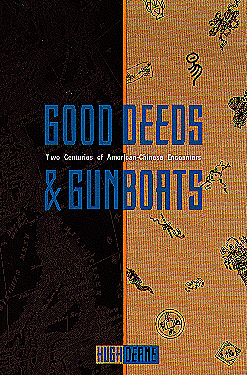GOLDSEA | ASIAN BOOKVIEW | NONFICTION
Good Deeds & Gunboatsby Hugh Deane
China Books & Periodicals, San Francisco, 1990, 258pp, $29.95
Two Centuries of American-Chinese Encounters
EXCERPT
 n 1771, four years before the outbreak of the American Revolution, a
member of the American Philosophical Society argued that the colonies could
gain much by emulating the ancient land of China. "Could we be so fortunate
as to introduce...the arts of living and improvements in husbandry, as well
as their native plants, America might in time become as populous as China."
n 1771, four years before the outbreak of the American Revolution, a
member of the American Philosophical Society argued that the colonies could
gain much by emulating the ancient land of China. "Could we be so fortunate
as to introduce...the arts of living and improvements in husbandry, as well
as their native plants, America might in time become as populous as China."
The China reached in 1784 by the Empress of China and the other
trading ships that followed swiftly in her wake was generally seen as a
formidable power and held in respect. Captain Amassa Delano, an early
trader in seal skins and a collateral forbear of President Franklin Delano
Roosevelt, wrote that "China is the first for greatness, riches and grandeur of
any country ever known."
But the outward appearance of strength and serenity concealed inner decay
and disintegration. China's pyramidal society, in which a landed elite lived
in refined comfort and splendor on the surplus produced by an industrious
peasantry, was showing signs of cyclical decline. The impact of the traders
and opium traffickers from the West interacted with and exacerbated the
internal causes of social dissolution, which were linked to the rapid growth
of population. The opium trade, in which Americans quickly joined the
British, drained China of silver. (In 1839 alone no less than 5.3 million
pounds of the drug were brought to China.) Later imports of British textiles
and other manufactures had a devastating effect on China's cottage
industries. The Opium War of 1840-42, initiated by the British in
furtherance of trade generally and the opium bonanza in particular, exposed
China's military weakness and its anachronistic view of itself as the civilized
center of an otherwise barbarian world, and began a Chinese century of
defeat , exploitation and humiliation. The Anglo-Indian assault added a new
word to the English language--loot, from the Hindi and Sanskrit.

The "unequal treaties" forced upon China by foreign powers and the division of much of China into Western enclaves and "spheres of influence" turned China into what Sun Yat-sen later termed a "hypocolony," the colony of many nations. "Today we are the poorest and weakest nation in the world...," the revolutionary nationalist wrote. "Other men are the carving knife and the serving dish, we are the fish and the meat."
ASIAN AIR ISSUES FORUM |
CONTACT US
© 1999-2003 GoldSea
No part of the contents of this site may be reproduced without prior written permission.
